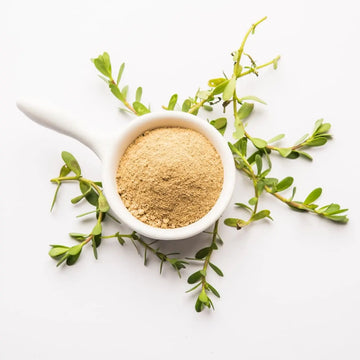Tulsi: Ocimum Sanctum - Adaptogenic Herb, Ayurvedic Treasure
The leading cause of global morbidity and mortality is chronic diseases related to lifestyle. Many of these can therefore be managed through Ayurvedic methods, known as healthy lifestyle medicine, including regular consumption of adaptogenic herbs. Of all the herbs used in Ayurveda, tulsi (Ocimum sanctum) is of particular importance, and scientific research now confirms its beneficial effects.
Tulsi Health Properties and Benefits
There is growing evidence that tulsi (also called holy basil) can alleviate physical, chemical, metabolic, and mental stress through a unique combination of pharmacological actions. Tulsi has been found to protect organs and tissues from chemical stress caused by industrial pollutants and heavy metals, and physical stress resulting from prolonged exercise, ischemia, physical restraint, and exposure to cold and excessive noise. Tulsi has also been shown to counteract metabolic stress by normalizing blood glucose, blood pressure, and lipid levels, and mental stress by positively affecting memory and cognition, and through its anti-anxiety and antidepressant properties. (1)
The cultivation of tulsi has both spiritual and practical significance that connects the grower with the creative forces of nature, and organic cultivation offers solutions to food security, rural poverty, hunger, environmental degradation and climate change. The use of tulsi in daily rituals is a testament to Ayurvedic wisdom and an example of ancient knowledge offering solutions to modern problems.
Regular use Holy Basil can bring many benefits, but it is worth remembering that every body is different and the effects may vary depending on individual predispositions. It is also worth consulting a doctor before starting to use tulsi, especially in the case of existing diseases or taking other medications.
How to consume Tulsi for best results?
Proper taking tulsi is essential to obtaining the optimal health benefits of this herb. There are several forms of Tulsi available on the market, and each may have slightly different dosage recommendations. In this guide, we will discuss the different forms of Tulsi and the recommended dosages.
1. Tulsi Leaves : Fresh Tulsi leaves can be added to salads, drinks or dishes. The recommended dosage is 2-3 leaves per day. They can also be brewed as a tea by adding 5-6 leaves to a cup of boiling water and steeping for 5-10 minutes.
2. Tulsi Tea : Tulsi tea is available in sachets or dried form. The recommended dosage is 1-2 cups of tea per day. To prepare the tea, pour a cup of boiling water over a sachet or teaspoon of the dried herb and steep for 5-10 minutes.
3. Tulsi Extract : Tulsi extract can be found in liquid, capsule or tablet form. The dosage depends on the concentration of the extract and individual needs. It is usually recommended to use 300-600 mg of the extract daily, divided into 2-3 doses. However, the manufacturer's recommendations should always be followed.
4. Ayurvedic Tulsi Juice : it should be taken diluted with water, according to the instructions on the package.
It is important to take tulsi as directed to avoid potential side effects. If you have any doubts about the dosage or form of Tulsi, it is worth consulting a doctor or herbal specialist.
Is basil the same as tulsi?
Asian basil and Tulsi are two different plants, although often confused due to their similarities. Asian basil, also known as Ocimum basilicum, is a popular culinary spice, while Tulsi, or Ocimum sanctum, is a plant with health-promoting properties.
Similarities Between Asian basil and Tulsi include the appearance of the plants as well as some of the health properties. Both plants have light green leaves, as well as a similar taste and aroma. The health properties of holy basil include anti-inflammatory, antibacterial, and antioxidant effects, which are also present in Tulsi.
However, there are also significant differences between the two plants. First of all, the use of Asian basil is mainly culinary - it is used as a spice. Tulsi, on the other hand, is used in natural medicine, especially in Ayurveda, as an adaptogenic herb, supporting the immune and nervous systems.
Tulsi Extract and Its Uses
Extract from Tulsi contains a wealth of active ingredients, such as flavonoids, terpenoids, eugenol, ursolic acid and oleanolic acid. Thanks to these substances, this extract has strong antioxidant, antibacterial, antiviral, anti-inflammatory and adaptogenic properties. (2)
Tulsi extract is used to relieve various ailments such as:
-
bacterial and viral infections, (4), (1)
-
respiratory problems, allergies, (4)
-
stress and sleep disorders, (1)
-
digestive problems,(4)
-
skin diseases, e.g. acne or eczema, (3)
-
scalp problems (acne) (3)
In supplementation, Holy basil extract is mainly used as an adaptogen, helping the body cope with stress and improving overall physical and mental performance. In addition, this extract can be used to support the prevention and treatment of various diseases, such as diabetes, heart disease, and immune system disorders.
Tulsi in body, face and scalp care
Due to the fact that tulsi has a very beneficial effect on the skin, it is used in cosmetics. For application to the skin, it is best to prepare a paste (mask) from the powdered leaves of this plant and rose water.
Tulsi and Shikakai Therapeutic Shampoo Recipe
Holy basil leaf powder can also be applied to the scalp. A good way is to prepare a herbal therapeutic shampoo consisting of shikakai powder (50% - natural foaming agent), tulsi powder (50%). A paste should be made from the herbs, applied to the scalp and gently massaged. You can leave it for up to 30 minutes, then rinse thoroughly with clean water.

Tulsi is also a common ingredient in scalp lotions, because conditioning the scalp contributes to better hair growth.
TULSI detox organic soap has cleansing properties and is prepared using the traditional cold process method.
Massage, aromatherapy and inhalation with tulsi
Tulsi essential oil can be used for massage, inhalation or aromatherapy . However, it should be remembered that this oil is very concentrated and should be used with caution. It is recommended to dilute the oil in a ratio of 1:3 with a carrier oil before applying to the skin. For inhalation, add 2-3 drops of oil to a bowl of hot water and inhale the vapors for a few minutes.
Contraindications and side effects of using Tulsi
Although Tulsi is a herb with many health benefits, there are some tulsi contraindications and potential side effects to be aware of. In some cases, this herb may not be recommended or may require caution.
First of all, pregnant and breastfeeding women should avoid using Tulsi as there is insufficient data on its safety during these periods.
People taking antidiabetic, anticoagulant, or antiplatelet medications should also consult their doctor before using Tulsi, as the herb may interfere with the action of these medications, which may lead to unwanted interactions.
In conclusion, Tulsi (Ocimum Sanctum) is a valuable adaptogenic herb that can provide many health benefits. It is worth paying attention to its properties and uses to fully utilize the potential of this plant in taking care of health and well-being.
1) Cohen MM. Tulsi - Ocimum sanctum: A herb for all reasons. J Ayurveda Integr Med. 2014 Oct-Dec;5(4):251-9. doi: 10.4103/0975-9476.146554. PMID: 25624701; PMCID: PMC4296439.
2) M, Choonharuangdej S, Shrestha B, Srithavaj T. Antimicrobial Properties of Ocimum Species: An In Vitro Study. J Int Soc Prev Community Dent. 2022 Dec 30;12(6):596-602. doi: 10.4103/jispcd.JISPCD_155_22. PMID: 36777016; PMCID: PMC9912833.
3) W, Punyoyai C, Sriyab S, Prommaban A, Sirilun S, Maitip J, Chantawannakul P, Neimkhum W, Anuchapreeda S. Anti-Inflammatory and Antimicrobial Activities of Fermented Ocimum sanctum Linn. Extracts against Skin and Scalp Microorganisms. Chem Biodivers. 2022 Feb;19(2):e202100799. doi: 10.1002/cbdv.202100799. Epub 2022 Jan 13. PMID: 34935261.
4) Kamyab AA, Eshraghian A. Anti-Inflammatory, gastrointestinal and hepatoprotective effects of Ocimum sanctum Linn: an ancient remedy with new application. Inflamm Allergy Drug Targets. 2013 Dec;12(6):378-84. doi: 10.2174/1871528112666131125110017. PMID: 24266685.




